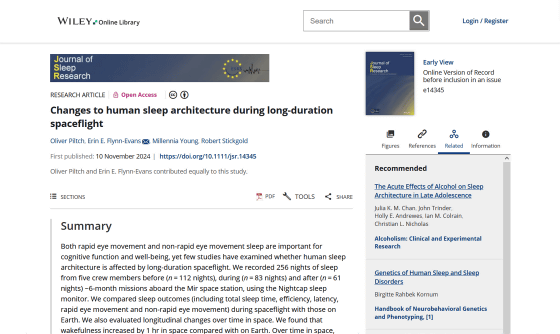Spaceflight may worsen sleep quality and quantity

Astronauts face a variety of challenges during space missions, including the fact that their sleep patterns are easily disrupted in space. A study analyzing the sleep patterns of astronauts who have actually stayed in space suggested that space flight has a variety of adverse effects on the quality and quantity of sleep.
Changes to human sleep architecture during long‐duration spaceflight - Piltch - Journal of Sleep Research - Wiley Online Library

Astronaut sleep study reveals how spaceflight alters rest patterns
https://www.psypost.org/astronaut-sleep-study-reveals-how-spaceflight-alters-rest-patterns/
Sleep is crucial for physical health, emotional regulation, and cognitive performance, so ensuring quality and quantity of sleep is essential in high-risk environments such as space missions. However, many astronauts report disrupted sleep patterns during spaceflight, and it is known that average sleep time tends to be shorter. This is thought to be due to factors such as stress, microgravity, misalignment of circadian rhythms, and the environment inside the spacecraft.
A research team from Harvard University and NASA analyzed data collected from astronauts who spent an average of 180 days aboard the Russian space station Mir between 1996 and 1998, and looked at the differences in sleep patterns between on Earth and in space.
All five subjects were male astronauts, with an average age of 43.5 at launch. They were trained to wear a nightcap to measure sleep stages based on eye and body movements. Sleep data was collected from the astronauts for an average of 22.4 nights before the space mission, 16.6 nights during the Mir mission, and 12.2 nights after the space mission. The astronauts also followed a consistent 24-hour schedule, following Moscow time, during the mission, and there were no major changes to their daily lives.
'These data were collected using a system that measures changes in eye movements to determine when astronauts were experiencing REM or non-REM sleep ,' said Erin Flynn-Evans, co-author of the paper and director of the Fatigue Countermeasures Laboratory at NASA's Ames Research Center. 'These sleep stages represent different processes in the brain. For example, deep sleep from stage 3 onwards is associated with the removal of waste products from the brain, while REM sleep and stage 2 sleep are specifically associated with learning and memory consolidation.'

Analysis of the data revealed that astronauts experienced significant changes in their sleep patterns during spaceflight compared to their time on Earth: astronauts slept an average of about one hour less during spaceflight than on Earth, and their total sleep time per night dropped from 6.7 hours pre-flight to 5.7 hours.
In addition, their sleep efficiency, which indicates the percentage of time spent asleep in their bunk, dropped significantly from 89% before the flight to 73%. Furthermore, it was reported that the time it took to fall asleep doubled in space, and their level of alertness after falling asleep increased by about three times.
Focusing on sleep stages, it was found that both REM and non-REM sleep were reduced during spaceflight. Before the flight, REM sleep accounted for 26.4% of sleep time, but during spaceflight, this proportion decreased to 19.6%. During the space mission, the amount of REM sleep gradually recovered to the same level as before the flight, but the amount of non-REM sleep decreased instead.
'Compared to baseline, we observed significant changes in sleep architecture during spaceflight, some of which changed over the course of the mission,' said Oliver Pilch, lead author of the paper and professor at Harvard University. 'Our findings are consistent with previous studies that have focused on issues of sleep continuity. We found that subjects' sleep efficiency decreased significantly during spaceflight, even though they spent the same amount of time in bed.'

In addition, after the astronauts returned to Earth, their sleep patterns returned to those before the flight, and there was no lasting effect on the subjects' sleep patterns.
'Sleep is important for optimal cognitive function both on Earth and in space, and spaceflight may affect sleep in space,' said Flynn-Evans, who argued that further research is needed to verify the results. He said he would like to conduct a sleep study using EEG with a larger sample size in the future.
in Science, Posted by log1h_ik